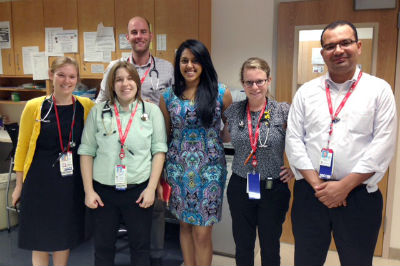
Categorical Pediatrics Track

The Categorical (CAT) Track is our largest track. It offers outstanding subspecialty and primary care experiences to help prepare residents for any future career.
Each resident is assigned a mentor who helps guide career and educational choices. The flexibility of this track allows residents to use their elective time to customize their training to their specific interests and goals, as well as to take advantage of the many opportunities provided by the other tracks.
Our Curriculum
During intern year, CAT residents serve as the patient's primary physician on inpatient and outpatient services under the supervision of a senior resident and an attending physician. Academic pediatric hospitalist faculty provide 24-hour in-house supervision for both general pediatric inpatient teams.
All interns complete three blocks of inpatient pediatrics, including two blocks of Pediatric Hospital Medicine, and one block of inpatient Neurology. Interns also complete two blocks of hybrid outpatient/inpatient subspecialties which may include Gastroenterology, Pulmonology, Infectious Diseases and/or Endocrinology. All interns also complete one block of Well Baby Nursery at Holy Cross Hospital, one block in The George Washington University Level III(b) NICU, spend time in our Children’s National Emergency Department and one block in outpatient general pediatric clinic.
First-year residents choose their activities during elective and subspecialty selective rotations to explore individual interests. There are five weeks of vacation time during intern year.


Quotes from Residents
One of our strengths is the exposure to different cases, and the availability of highly experienced subspecialists.
Categorical Track Resident
Categorical Track Resident Accomplishments
Sample REACH projects completed by residents in the Categorical Track include:
- The Youth Scholars Program in Patient-Centered Outcomes Research (YSP): Evaluation of a Research Training Program for Adolescent Parents
- Examining the Relationship between Preterm Neonatal Nutrition and Maternal-Infant Stress
- Evaluating Use of Institutional Guidelines for Management of CLABSI in Short Bowel Syndrome Patients
- Fertility Concerns in Adolescents and Young Adults Receiving Gonadotoxic Medications for Rheumatic Disease
- Correlation of Postpartum Depression with Food, Housing, and Transportation Insecurity in a Level IV NICU
- Improving Experience of Patients and Families Affected by Autism in the Primary Care Setting
- Implementing Patient-Reported Outcome Measures in Pediatric Oncology Clinics
- Caregiver Stress Screening and Access to Mental Health Resources in Primary Care Youth with Medical Complexity
- The Use of AI with CNH EHR Data to Derive Sepsis Phenotypes to Personalize Treatment and Improve Outcomes
- Evaluation of DC Medicaid Coverage for Guideline-Directed Asthma Therapy Coupled with Provider-Oriented Educational Interventions
- Enhancing Caregiver Engagement in Care and Reducing Stress in the PICU through Use of Caregiver Voice Recording as Nonpharmacologic Calming Measure for Intubated Pediatric Patients
- Time to Intervention in Posthemorrhagic Hydrocephalus and the Impact on Neurodevelopment in Preterm Infants



